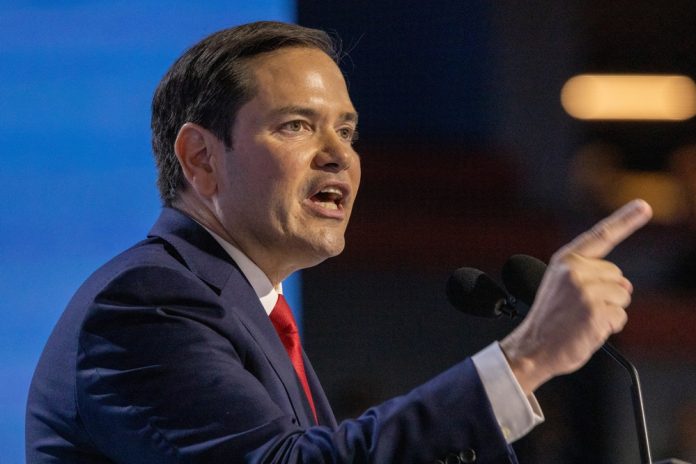
Secretary of State Marco Rubio has revoked thousands of student visas under President Trump’s “one-strike” policy, escalating the battle against anti-American sentiment on college campuses.
Key Takeaways
- The Trump administration has implemented a “Catch-And-Revoke” policy for foreign students and H-1B visa holders who violate any US laws, with thousands of visas already canceled.
- Secretary of State Marco Rubio defended the policy during a heated Senate hearing, emphasizing that “a visa is a privilege, not a right.”
- Several foreign students with pro-Palestinian views have been detained, including Turkish student Rumeysa Ozturk, who was held for six weeks before a judge ordered her release.
- The policy specifically targets foreign students involved in campus protests and those expressing anti-Israel sentiments, which the administration views as threats to campus safety.
- The Trump administration is simultaneously pressuring universities to eliminate diversity, equity, and inclusion programs, with threats to federal funding.
Trump’s “One-Strike” Immigration Policy Targets Foreign Students
The Trump administration has dramatically ramped up visa revocations for international students and temporary visa holders since taking office. What began as 300 cancellations earlier this year has now escalated to “probably thousands,” according to Secretary of State Marco Rubio. The policy shows President Trump’s commitment to curbing what his administration views as anti-American sentiment and campus disruption by foreign nationals who are guests in our country.
The “Catch-And-Revoke” policy introduced by Rubio marks a significant shift in immigration enforcement. Previously, only serious criminal offenses would trigger visa revocations, but now even minor infractions can lead to immediate deportation. The State Department is actively searching federal databases for any legal issues involving foreign students, with a reported 6,400 international students already flagged for potential visa termination. This approach finally puts Americans first by ensuring that those who abuse our hospitality face swift consequences.
“Critically, the State Department has now made clear that a visa is a privilege, not a right,” said Marco Rubio, Secretary of State.
Senate Hearing Reveals Tensions Over Visa Revocations
A heated exchange during a recent Senate hearing highlighted the political divide over the administration’s visa policy. Democratic Senator Chris Van Hollen challenged Rubio over the case of Rumeysa Ozturk, a Turkish graduate student who was detained for over six weeks after writing an op-ed about the Gaza conflict. Van Hollen’s criticism was met with a firm response from Rubio, who remained steadfast in defending the administration’s approach to foreign students who spread anti-Israel sentiment.
“Your regret for voting for me confirms I’m doing a good job,” Rubio told Van Hollen during the contentious exchange, clearly showing the administration’s unwavering commitment to this policy despite liberal opposition. The clash underscores the deep ideological differences in how America should handle foreign visitors who engage in political activities that the administration considers disruptive and potentially dangerous to our national interests and campus safety.
“A visa is not a right, it is a privilege. If you’re coming to the US to lead campus crusades, to take over libraries, to try to burn down buildings, and commit acts of violence, we are not going to give you a visa,” said Marco Rubio, Secretary of State.
Real-World Impact on Foreign Students
The Trump administration’s policy has already affected numerous foreign students across American campuses. Columbia University student Mahmoud Khalil remains detained in Louisiana for organizing college encampments, while Turkish student Rumeysa Ozturk was released only after a federal judge intervened, citing a lack of evidence beyond her written opinion piece. These cases demonstrate the administration’s serious approach to addressing what they view as anti-American sentiment being fostered by foreign nationals on U.S. soil.
“I don’t know the latest count, but we probably have more to do. We’re going to continue to revoke the visas of people who are here as guests and are disrupting our higher education facilities,” said Secretary of State Marco Rubio.
Legal challenges to the policy have emerged, with some courts issuing restraining orders to halt deportations. Immigration attorneys are advising affected students to fight the revocations, citing constitutional concerns. However, the administration remains focused on its goal of ensuring that American universities are not breeding grounds for anti-American sentiment or providing platforms for foreign nationals to undermine our values and interests while enjoying the benefits of our education system.
Broader Implications for American Higher Education
The visa revocation policy is part of a larger effort by the Trump administration to reform American higher education. Universities are facing pressure to eliminate diversity, equity, and inclusion programs, with threats to their federal funding if they fail to comply. This coordinated approach demonstrates President Trump’s commitment to restoring traditional American values in our educational institutions and ensuring that taxpayer dollars are not used to fund programs that undermine our national identity and interests.
“What we’re seeing recently, particularly in the F-1 student context, is a shift,” said Steven Brown, immigration attorney.
The administration’s actions signal a return to immigration policies that prioritize American interests and security over the desires of foreign nationals. By taking a firm stance on visa privileges, President Trump is fulfilling his campaign promises to put America first and protect our institutions from those who would take advantage of our generosity while undermining our values. This approach represents a significant departure from previous administrations that often placed global interests above those of American citizens.














